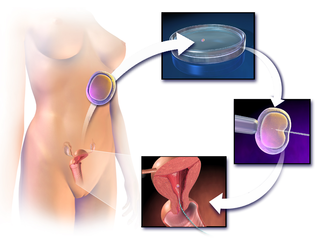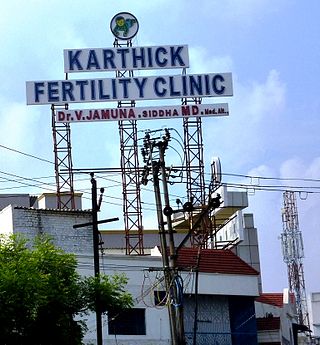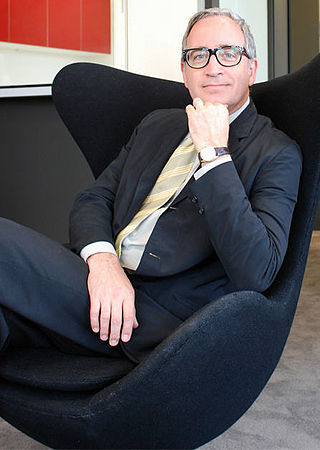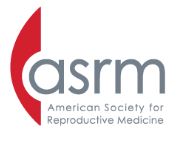
In vitro fertilisation (IVF) is a process of fertilisation where an egg is combined with sperm in vitro. The process involves monitoring and stimulating a patient's ovulatory process, removing an ovum or ova from their ovaries and letting sperm fertilise them in a culture medium in a laboratory. After the fertilised egg (zygote) undergoes embryo culture for 2–6 days, it is transferred by catheter into the uterus, with the intention of establishing a successful pregnancy.
Infertility is the inability of an animal or plant to reproduce by natural means. It is usually not the natural state of a healthy adult, except notably among certain eusocial species. It is the normal state of a human child or other young offspring, because they have not undergone puberty, which is the body's start of reproductive capacity.

Preimplantation genetic diagnosis is the genetic profiling of embryos prior to implantation, and sometimes even of oocytes prior to fertilization. PGD is considered in a similar fashion to prenatal diagnosis. When used to screen for a specific genetic disease, its main advantage is that it avoids selective abortion, as the method makes it highly likely that the baby will be free of the disease under consideration. PGD thus is an adjunct to assisted reproductive technology, and requires in vitro fertilization (IVF) to obtain oocytes or embryos for evaluation. Embryos are generally obtained through blastomere or blastocyst biopsy. The latter technique has proved to be less deleterious for the embryo, therefore it is advisable to perform the biopsy around day 5 or 6 of development.

Assisted reproductive technology (ART) includes medical procedures used primarily to address infertility. This subject involves procedures such as in vitro fertilization (IVF), intracytoplasmic sperm injection (ICSI), cryopreservation of gametes or embryos, and/or the use of fertility medication. When used to address infertility, ART may also be referred to as fertility treatment. ART mainly belongs to the field of reproductive endocrinology and infertility. Some forms of ART may be used with regard to fertile couples for genetic purpose. ART may also be used in surrogacy arrangements, although not all surrogacy arrangements involve ART. The existence of sterility will not always require ART to be the first option to consider, as there are occasions when its cause is a mild disorder that can be solved with more conventional treatments or with behaviors based on promoting health and reproductive habits.
Fertility medications, also known as fertility drugs, are medications which enhance reproductive fertility. For women, fertility medication is used to stimulate follicle development of the ovary. There are very few fertility medication options available for men.

Reproductive medicine is a branch of medicine concerning the male and female reproductive systems. It encompasses a variety of reproductive conditions, their prevention and assessment, as well as their subsequent treatment and prognosis.

Fertility clinics are medical clinics that assist couples, and sometimes individuals, who want to become parents but for medical reasons have been unable to achieve this goal via the natural course. Clinics apply a number of diagnosis tests and sometimes very advanced medical treatments to achieve conceptions and pregnancies.

Oocyte cryopreservation is a procedure to preserve a woman's eggs (oocytes). This technique has been used to enable women to postpone pregnancy to a later date – whether for medical or social reasons. Several studies have shown that most infertility problems are due to germ cell deterioration related to aging. The procedure intends that the woman may choose to have the eggs thawed, fertilized, and transferred to the uterus as embryos to facilitate a pregnancy in the future. The procedure's success rate varies depending on the age of the woman, with the odds being higher in younger, adult women.
Reproductive endocrinology and infertility (REI) is a surgical subspecialty of obstetrics and gynecology that trains physicians in reproductive medicine addressing hormonal functioning as it pertains to reproduction as well as the issue of infertility. While most REI specialists primarily focus on the treatment of infertility, reproductive endocrinologists are trained to also test and treat hormonal dysfunctions in females and males outside infertility. Reproductive endocrinologists have specialty training (residency) in obstetrics and gynecology (ob-gyn) before they undergo sub-specialty training (fellowship) in REI.
Fertility preservation is the effort to help cancer patients retain their fertility, or ability to procreate. Research into how cancer, ageing and other health conditions effect reproductive health and preservation options are growing. Specifically sparked in part by the increase in the survival rate of cancer patients.
Carlos Sueldo is a physician and professor of obstetrics and gynaecology (OB/GYN) for the University of California, San Francisco. Dr. Sueldo is also the founder (1984) and present Director of the in vitro fertilization IVF Fertility Center. Dr. Sueldo concurrently serves as the Scientific Director at the Center for Gynecology and Reproduction (CEGYR) in Buenos Aires, Argentina, and is a founding board member of the World Endometriosis Research Foundation.
Fertility and Sterility is a monthly peer-reviewed medical journal published by Elsevier on behalf of the American Society for Reproductive Medicine. It was established in 1950 and is an official journal of several societies. The journal covers research in basic and clinical reproduction, primarily concerning human fertility, and addresses related ethical and societal issues.

Dr. Paul J Turek is an American physician and surgeon, men's reproductive health specialist, and businessman. Turek is a recent recipient of a National Institutes of Health (NIH) grant for research designed to help infertile men become fathers using stem cells.

Ashok Agarwal is the Director of the Andrology Center, and also the Director of Research at the American Center for Reproductive Medicine at Cleveland Clinic, Cleveland, USA. He is Professor at the Cleveland Clinic Lerner College of Medicine of Case Western Reserve University, USA. Ashok is a Senior Staff in the Cleveland Clinic's Glickman Urological and Kidney Institute. He has published extensive translational research in human infertility and assisted reproduction.
Alan H. DeCherney is an Obstetrician and Gynecologist who specializes in reproductive endocrinology & infertility. He is experienced in reproductive and endocrinology, infertility, and reproductive genetics.
Alexander M. Feskov is a Ukrainian physician, reproductive scientist, and ultrasonographer who specialises in reproductive technology and fertility treatment.

Duru Shah is a Mumbai-based gynaecologist academic and women activist. She is the Founder President of the PCOS Society, India and a promoter of adolescent girls and women's health and infertility in India. Shah is also the promoter of Metropolis Healthcare Ltd. She is also a Consultant ObGyn.: Breach Candy Hospital, Jaslok Hospital, Mumbai.

Vardit Ravitsky is a bioethicist, researcher, and author. She is president and CEO of The Hastings Center, a full professor at the University of Montreal, and a senior lecturer on Global Health and Social Medicine at Harvard Medical School. She is immediate-past president and current vice-president of the International Association of Bioethics, and the director of Ethics and Health at the Center for Research on Ethics. She is a Fellow of the Pierre Elliott Trudeau Foundation, where she chaired the COVID-19 Impact Committee. She is also Fellow of The Hastings Center and of the Canadian Academy of Health Sciences.
Dmitri Dozortsev is a Russian-American physician scientist, inventor and researcher. Dozortsev's contributions in research and publications are mostly in the areas of human reproductive medicine and biology. In particular, he is best known for his studies of in vitro fertilisation and embryo transfer. Dozortsev currently serves as President of the American College of Embryology and as Director of Omni-Med laboratories.
Catharyn Johanna Stern is a clinical associate professor, and gynaecologist at Waverley Private Hospital in Melbourne, Victoria. She was appointed an Officer of the Order of Australia for distinguished service to gynaecology, reproductive medicine and fertility research. Stern has been a member of the Australian Medical Association (AMA) member for 23 years. Her award was for her services to gynaecology, to reproductive medicine and fertility research, and to the community.










